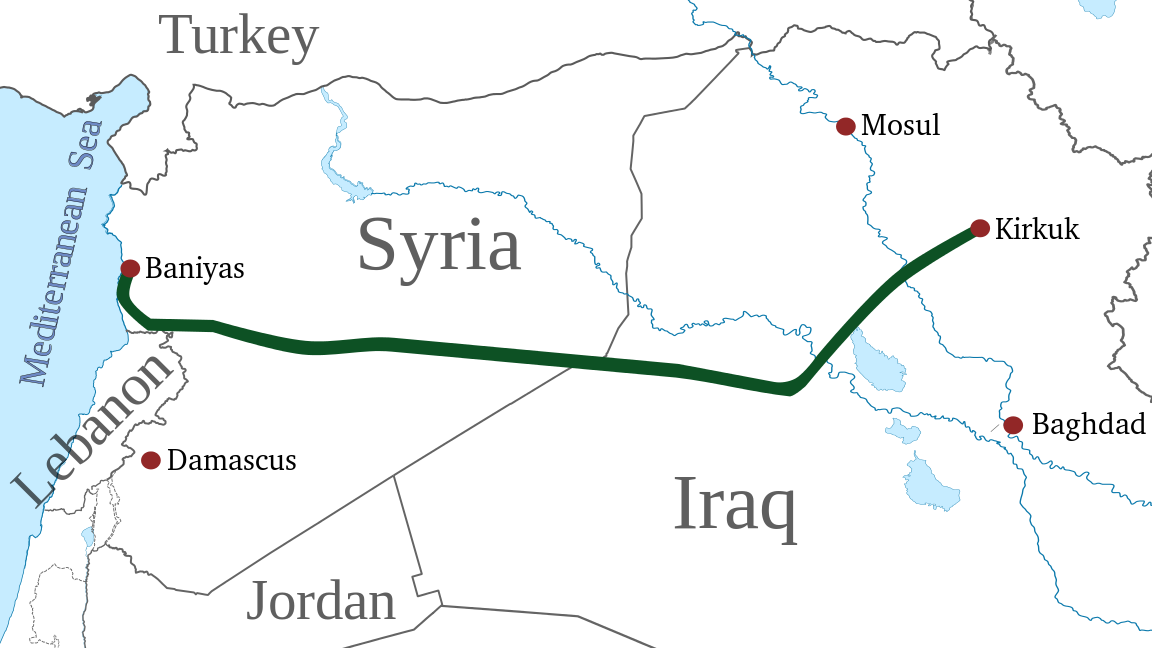Syria and Iraq are in talks to reactivate the strategic Kirkuk–Banias oil pipeline, Iraqi Trade Minister Atheer al-Ghurairy revealed in an interview with Sputnik that was published on May 5.
The minister told the Russian news agency that he discussed the matter with Syria’s Oil Minister Firas Kaddour earlier this month.
The reactivation of the Kirkuk-Banias oil pipeline will be “crucial” for Syria as it would end the country’s power crisis, the minister said, adding that the pipeline is of an “exponential importance” for Iraq as it could cut the cost of exporting oil.
Atheer said that initial assessments indicate that the oil pipeline, which was heavily damaged during the war in Syria and recent conflicts in Iraq, is in need of extensive maintenance with a high cost. According to the minister, one possible scenario to solve this issue is for each country to bear the cost of fixing the damage on its part of the pipeline.
The 800-kilometer long pipeline, which can discharge 0.3 million barrels of oil per day, was constructed by the American Bechtel Corporation.
The pipeline was commissioned in 1952. Between 1982 and 2000 the pipeline was shut by Iraq, due to Syrian support to Iran during the Iran–Iraq war, and its later support for the liberation of Kuwait campaign. During the 2003 invasion of Iraq, the pipeline was damaged by United States airstrikes and remained out of operation since then.
Syria and Iraq made several attempts to reactivate the strategic oil pipeline between 2007 and 2010. However, technical and political hurdles kept the pipeline shut down.
The reactivation of the pipeline will lower the cost of producing oil from Iraq’s northern fields, which holds some 12% of the country’s reserve, as well as the cost of exporting the oil. It will also help Iraq increase its production by allowing it access to oil refineries in Syria. This would contribute greatly to the country’s plan to step up oil production to eight million barrels per day by 2027.
The export of Iraqi oil through Syrian ports could end the country’s power crisis, which is caused by the U.S. occupation of all key oil and gas fields. It could also help reactivate Syrian ports on the Mediterranean Sea.
Syrian and Iraqi efforts to reactivate the Kirkuk-Banias oil pipeline will likely face several obstacles, mainly sanctions imposed by the U.S. and the European Union. However, Syria’s recent rapprochement with key regional allies of the West, including Saudi Arabia, Iraq’s special relations with Iran, and the current global energy crisis could allow the two countries to reach a deal on the pipeline.
MORE ON THIS TOPIC:







I bet this pipeline will end up like NS1/2 thanks to Americans and their Jews in control. This would not benefit US or Israeli oligarchy, only Syrian and iraqi people.
Yes, but also Syrians and Iraqis are attacking each other. Group vs group.
This is what the Syrian war was all about the French wanted this pipeline in their control but the Syrians listened to their allies the Russians and refused. So good for Syria
How is that supposed to happen when isreal if bombing syria more and more every day they seem to think that russia is to busy in ukraine and they can get away with more and more.
I am glad the Middle East has woken up to the EVIL of USA and now is regrouping again after they’ve been separated and conquered by USA fake democracy that destroyed many countries, killed millions of innocent people and made millions of refugees. Syria if rejoining the Arab League and Iran is also joining with the help of Saudi Arabia. Remember the region is rich and does not need USA or EU. BRICS soon to finally topple the $ that killed both Saddam and Gaddafi….EVIL will never win! Truth always prevails!